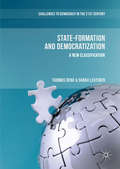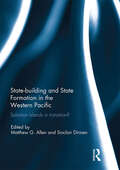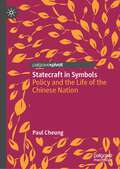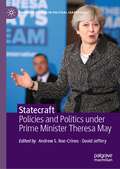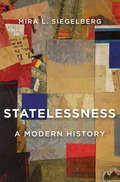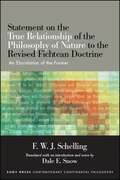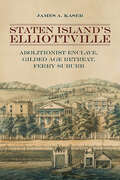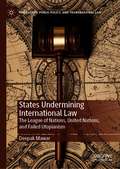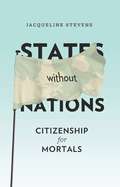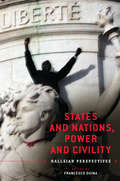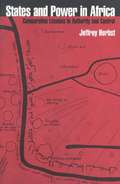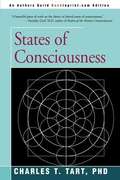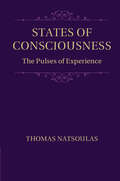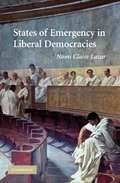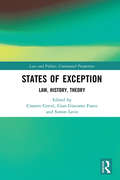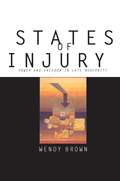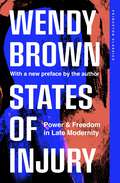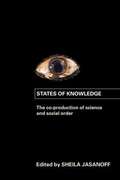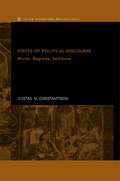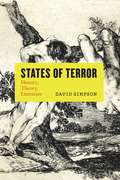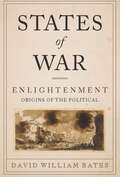- Table View
- List View
State-Formation and Democratization: A New Classification (Challenges to Democracy in the 21st Century)
by Thomas Denk Sarah LehtinenThis book examines the connection between two major developments in the world: state-formation and democratization. Since 1946, the number of states has increased from 66 to almost 200 independent states, but our knowledge of these state-formation processes is limited. The authors present a new database on state-formation and democratization, which enables novel classifications and analyses of these processes on the global level. They argue that the form of state-formation affects the probability for democratization in new states and that the initial regime that state-formation establishes at the time of independence has long-term effects on new states’ democratization.
Statebuilding and State Formation in the Western Pacific: Solomon Islands in Transition?
by Matthew G. Allen Sinclair DinnenThis book provides a rigorous and cross-disciplinary analysis of this Melanesian nation at a critical juncture in its post-colonial and post-conflict history, with contributions from leading scholars of Solomon Islands. The notion of ‘transition’ as used to describe the recent drawdown of the decade-long Regional Assistance Mission to Solomon Islands (RAMSI) provides a departure point for considering other transformations – social, political and economic –under way in the archipelagic nation. Organised around a central tension between change and continuity, two of the book’s key themes are the contested narratives of changing state–society relations and the changing social relations around land and natural resources engendered by ongoing processes of globalisation and urbanisation. Drawing heuristically on RAMSI’s genesis in the ‘state- building moment’ that dominated international relations during the first decade of this century, the book also examines the critical distinction between ‘state-building’ and ‘state formation’ in the Solomon Islands context. It engages with global scholarly and policy debates on issues such as peacebuilding, state-building, legal pluralism, hybrid governance, globalisation, urbanisation and the governance of natural resources. These themes resonate well beyond Solomon Islands and Melanesia, and the book will be of interest to a wide range of students, scholars and development practitioners. This book was previously published as a special issue of The Journal of Pacific History.
Statebuilding by Imposition: Resistance and Control in Colonial Taiwan and the Philippines (Studies of the Weatherhead East Asian Institute, Columbia University)
by Reo MatsuzakiHow do modern states emerge from the turmoil of undergoverned spaces? This is the question Reo Matsuzaki ponders in Statebuilding by Imposition. Comparing Taiwan and the Philippines under the colonial rule of Japan and the United States, in the late nineteenth and early twentieth centuries, he shows similar situations produce different outcomes and yet lead us to one conclusion.Contemporary statebuilding efforts by the US and the UN start from the premise that strong states can and should be constructed through the establishment of representative government institutions, a liberalized economy, and laws that protect private property and advance personal liberties. But when statebuilding runs into widespread popular resistance, as it did in both Taiwan the Philippines, statebuilding success depends on reconfiguring the very fabric of society, embracing local elites rather than the broad population, and giving elites the power to discipline the people. In Taiwan under Japanese rule, local elites behaved as obedient and effective intermediaries and contributed to government authority; in the Philippines under US rule, they became the very cause of the state's weakness by aggrandizing wealth, corrupting the bureaucracy, and obstructing policy enforcement. As Statebuilding by Imposition details, Taiwanese and Filipino history teaches us that the imposition of democracy is no guarantee of success when forming a new state and that illiberal actions may actually be more effective. Matsuzaki's controversial political history forces us to question whether statebuilding, given what it would take for this to result in the construction of a strong state, is the best way to address undergoverned spaces in the world today.
Statecraft in Symbols: Policy and the Life of the Chinese Nation
by Paul CheungThis book presents a study of how urban residency in China is regulated by state policy in the second decade of the 21st Century. Far from a straightforward divide between natives and newcomers, policy in this period has created delicate cross-classifications of internal migrants and attendant conditions under which they reside in particular urban areas. With reference to some of the most profound social theorists of the present day, such symbolic acts of division are explained as acts of statecraft carried out by different levels of public administration in the face of multiple quandaries. The book will appeal to those with an interest in the governance of population and territory in China, and by extension, in other parts of the contemporary world.
Statecraft: Policies and Politics under Prime Minister Theresa May (Palgrave Studies in Political Leadership)
by David Jeffery Andrew S. Roe-CrinesThis book examines the statecraft of former UK Prime Minister, Theresa May as a means of deconstructing her leadership of the United Kingdom. Alongside the inescapable issue of Brexit that dominated her Premiership, it takes a wider view of her record in government by looking at how and why she stood for the leadership of the Conservative Party; scrutinizes her approach to economic, social, and foreign policy; interrogates her attitudes towards Northern Ireland and the DUP; and her longstanding records on race relations, LGBT+ issues, and feminism, as well as more traditional concerns such as faith, constitution, and Britishness. This volume is the first of its kind to adopt such a systematic approach in its evaluation of May’s leadership.
Statehood and Self-Determination
by Duncan FrenchThe concepts of statehood and self-determination provide the normative structure on which the international legal order is ultimately premised. As a system of law founded upon the issue of territorial control, ascertaining and determining which entities are entitled to the privileges of statehood continues to be one of the most difficult and complex issues. Moreover, although the process of decolonisation is almost complete, the principle of self-determination has raised new challenges for the metropolitan territories of established states, including the extent to which 'internal' self-determination guarantees additional rights for minority and other groups. As the controversies surrounding remedial secession have revealed, the territorial integrity of a state can be questioned if there are serious and persistent breaches of a people's human rights. This volume brings together such debates to reflect further on the current state of international law regarding these fundamental issues.
Statelessness: A Modern History
by Mira L. SiegelbergThe story of how a much-contested legal category—statelessness—transformed the international legal order and redefined the relationship between states and their citizens.Two world wars left millions stranded in Europe. The collapse of empires and the rise of independent states in the twentieth century produced an unprecedented number of people without national belonging and with nowhere to go. Mira Siegelberg’s innovative history weaves together ideas about law and politics, rights and citizenship, with the intimate plight of stateless persons, to explore how and why the problem of statelessness compelled a new understanding of the international order in the twentieth century and beyond.In the years following the First World War, the legal category of statelessness generated novel visions of cosmopolitan political and legal organization and challenged efforts to limit the boundaries of national membership and international authority. Yet, as Siegelberg shows, the emergence of mass statelessness ultimately gave rise to the rights regime created after World War II, which empowered the territorial state as the fundamental source of protection and rights, against alternative political configurations.Today we live with the results: more than twelve million people are stateless and millions more belong to categories of recent invention, including refugees and asylum seekers. By uncovering the ideological origins of the international agreements that define categories of citizenship and non-citizenship, Statelessness better equips us to confront current dilemmas of political organization and authority at the global level.
Statelessness: On Almost Not Existing
by Tony C. BrownA pathbreaking new genealogy of statelessness Just as the modern state and the citizenship associated with it are commonly thought of as a European invention, so too is citizenship&’s negation in the form of twentieth-century diaspora and statelessness. Statelessness sets forth a new genealogy, suggesting that Europe first encountered mass statelessness neither inside its own borders nor during the twentieth century, as Hannah Arendt so influentially claimed, but outside of itself—in the New World, several hundred years earlier.Through close readings of political philosophers from Hobbes to Rousseau to Kant, Tony C. Brown argues that statelessness became a central problem for political thought early on, with far-reaching implications for thinking both on the state and on being human. What Europeans thought they saw among the &“savages&” of the Americas was life without political order, life less than human. Lacking almost everything those deemed clearly human had achieved, the stateless existed in a radically precarious, almost inhuman privation.And yet this existence also raised the unsettling possibility that state-based existence may not be inevitable, necessary, or even ideal. This possibility, as Brown shows, prompts the response—as defensive as it was aggressive—that we call Enlightenment political philosophy, which arguably still orders much thinking on being stateless today, including our discourses concerning migrants and Indigenous peoples.
Statement on the True Relationship of the Philosophy of Nature to the Revised Fichtean Doctrine: An Elucidation of the Former (SUNY series in Contemporary Continental Philosophy)
by F. W. SchellingThe heat of anger can concentrate the mind. Convinced that he had been betrayed by his former collaborator and colleague, Schelling attempts in this polemic to reach a final reckoning with Fichte. Employing the format of a book review, Schelling directs withering scorn at three of Fichte's recent publications, at one point likening them to the hell, purgatory, and would-be paradise of Fichtean philosophy. The central bone of contention is the understanding of nature: Fichte sees it as lifeless matter in motion, sheer opposition to be overcome, while Schelling waxes poetic in his defense of a living, organic nature of which humanity is a vital part. Indeed, we do not know ourselves without understanding our connection to nature, argues Schelling, anticipating many thinkers in contemporary environmental ethics.Dale E. Snow's introduction sets the stage and explains the larger context of the conflict, which was already visible in the correspondence of the two philosophers, which broke off by 1802. Notes are included throughout the text, providing background information and identifying the many references to Fichte.
Staten Island's Elliottville: Abolitionist Enclave, Gilded Age Retreat, Ferry Suburb
by James A. KaserThe story of a 19th century Staten Island town that nurtured the careers of nationally significant reformers, abolitionists, and transcendentalists.This book traces five decades of community life in a nineteenth-century Staten Island neighborhood informally called Elliottville, where extraordinary people lived. Its history illuminates the impact of transformative cultural, social, economic, and political change stemming from abolitionism, transcendentalism, the women's suffrage movement, and the rapid growth of the nation. Begun in 1839 as a therapeutic retreat, New Englanders with ties to Emerson settled there, forming a distinctive community. Their achievements in art, literature, and social reform attracted even more like-minded people, including Francis George Shaw, George William Curtis, Theodore Winthrop, Robert Gould Shaw, Helena de Kay Gilder, Charles de Kay, Anna Leonowens, and Maria "Midy" Morgan. Its vibrant intellectual life was threatened by an influx of Gilded Age men in the 1870s and destroyed when a freight rail line separated Elliottville from the Kill Van Kull. Drawing on a wealth of archival material and unique maps and illustrations, this book gives a vivid picture of how one small community could impact the country's intellectual and social development.
States Undermining International Law: The League of Nations, United Nations, and Failed Utopianism (Philosophy, Public Policy, and Transnational Law)
by Deepak MawarThis book analyses the history of international law to reveal the significant role utopianism has played in developing the international legal system. In fact, when pinpointing the legal system’s most accelerated phases of development, it becomes increasingly apparent how integral utopianism has been in dealing with the international community’s most troubled periods such as the World Wars. However, States have on numerous occasions undermined utopianism, leading to situations where individuals and communities have been vulnerable to modes of oppression such as war or repressive regimes. Thus, by examining the League of Nations and United Nations, this book seeks to show why utopianism continues to be a vital ingredient when the international community is seeking to ensure its loftiest and most ambitious goals such as maintaining international peace and security, and why for the sake of such utopian aspirations, the primary position States enjoy in international law requires reassessment.
States Without Nations: Citizenship for Mortals (New Directions in Critical Theory #34)
by Jacqueline StevensAs citizens, we hold certain truths to be self-evident: that the rights to own land, marry, inherit property, and especially to assume birthright citizenship should be guaranteed by the state. The laws promoting these rights appear not only to preserve our liberty but to guarantee society remains just. Yet considering how much violence and inequality results from these legal mandates, Jacqueline Stevens asks whether we might be making the wrong assumptions. Would a world without such laws be more just?Arguing that the core laws of the nation-state are more about a fear of death than a desire for freedom, Jacqueline Stevens imagines a world in which birthright citizenship, family inheritance, state-sanctioned marriage, and private land ownership are eliminated. Would chaos be the result? Drawing on political theory and history and incorporating contemporary social and economic data, she brilliantly critiques our sentimental attachments to birthright citizenship, inheritance, and marriage and highlights their harmful outcomes, including war, global apartheid, destitution, family misery, and environmental damage. It might be hard to imagine countries without the rules of membership and ownership that have come to define them, but as Stevens shows, conjuring new ways of reconciling our laws with the condition of mortality reveals the flaws of our present institutions and inspires hope for moving beyond them.
States and Nations, Power and Civility: Hallsian Perspectives
by Francesco DuinaCivility in national and international politics is under siege. In this volume, twelve distinguished sociologists and historians from North America, Europe, and China reflect on the nature and preservation of civility in and between nation states and empires in a set of geographically and historically wide-ranging chapters. Civility protects individual self-determination and expression, promotes productive economic activity and wealth, and is central to political stability and peace within and across political communities. Yet power, always concentrated and endemic in nation states and imperial settings, poses great risks to civility. Guided by the perspective of John A. Hall, who has done more to identify and investigate the intricate relationships between states, nations, the power they hold, and civility than any other contemporary social scientist, States and Nations, Power and Civility offers a set of crisp, in-depth investigations regarding the specific mechanisms of civility and how it may be protected.
States and Power in Africa: Comparative Lessons in Authority and Control
by Jeffrey HerbstTheories of international relations, assumed to be universally applicable, have failed to explain the creation of states in Africa. There, the interaction of power and space is dramatically different from what occurred in Europe. In his groundbreaking book, Jeffrey Herbst places the African state-building process in a truly comparative perspective, examining the problem of state consolidation from the precolonial period, through the short but intense interlude of European colonialism, to the modern era of independent states. Herbst's bold contention--that the conditions now facing African state-builders existed long before European penetration of the continent--is sure to provoke controversy, for it runs counter to the prevailing assumption that colonialism changed everything.In identifying how the African state-building process differs from the European experience, Herbst addresses the fundamental problem confronting African leaders: how to extend authority over sparsely settled lands. Indeed, efforts to exert control over vast, inhospitable territories of low population density and varied environmental and geographical zones have resulted in devastating wars, millions of refugees, and dysfunctional governments perpetrating destructive policies.Detailing the precise political calculations of distinct African leaders, Herbst isolates the basic dynamics of African state development. In analyzing how these leaders have attempted to consolidate power, he is able to evaluate a variety of policy alternatives for dealing with the fundamental political challenges facing African states today.
States of Consciousness
by Charles T. TartStates of Consciousness, a classic by world authority Charles T. Tart, is a basic understanding of how the mind is a dynamic, culturally biased, semi-arbitrary construction and system. A systematic exploration of how and why altered states can come about and their possibilities. Useful in understanding some of the important ways your mind works before you start altering it.
States of Consciousness: The Pulses of Experience
by Thomas NatsoulasStates of Consciousness extends Thomas Natsoulas' development of the psychology of consciousness by giving sustained attention to the stream of consciousness and its component 'pulses of experience'. Natsoulas' unrivalled scholarship across psychology, philosophy and cognate fields means that very often surprising connections are made between the works of leading theorists of consciousness, including Brentano, Mead, Bergmann, Strawson, James, Freud, Skinner, Hebb, Gibson, O'Shaughnessy and Woodruff Smith. At a time when interest in consciousness and the brain is growing rapidly, this book provides an in-depth analysis of sophisticated psychological accounts that pertain to consciousness. Its breadth of coverage and interdisciplinary nature will be of interest to postgraduates and specialists in a range of fields, particularly the history of psychology and philosophy of mind.
States of Emergency in Liberal Democracies
by Nomi Claire LazarIn an emergency, statesmen concentrate power and suspend citizens' rights. These emergency powers are ubiquitous in the crisis government of liberal democracies, but their nature and justification is poorly understood. Based on a pluralist conception of political ethics and political power, this book shows how we can avoid the dangers and confusions inherent in the norm/exception approach that dominates both historical and contemporary debate. The book shows how liberal values need never - indeed must never - be suspended, even in times of urgency. Only then can accountability remain a live possibility. But at the same time, emergency powers can sometimes be justified with reference to extra-liberal norms that also operate in times of normalcy. By emphasizing the continuity between times of normalcy and emergency, the book illuminates the norms of crisis government, broadening our understanding of liberal democratic government and of political ethics in the process.
States of Exception: Law, History, Theory (Law and Politics)
by Cosmin CercelThis book addresses the relevance of the state of exception for the analysis of law, while reflecting on the deeper symbolic and jurisprudential significance of the coalescence between law and force. The concept of the state of exception has become a central topos in political and legal philosophy as well as in critical theory. The theoretical apparatus of the state of exception sharply captures the uneasy relationship between law, life and politics in the contemporary global setting, while also challenging the comforting narratives that uncritically connect democracy with the tradition of the rule of law. Drawing on critical legal theory, continental jurisprudence, political philosophy and history, this book explores the genealogy of the concept of the state of exception and reflects on its legal embodiment in past and present contexts – including Weimar and Nazi Germany, contemporary Europe and Turkey. In doing so, it explores the disruptive force of the exception for legal and political thought, as it recuperates its contemporary critical potential. The book will be of interest to students and scholars in the field of jurisprudence, philosophy and critical legal theory.
States of Injury: Power and Freedom in Late Modernity
by Wendy BrownWhether in characterizing Catharine MacKinnon's theory of gender as itself pornographic or in identifying liberalism as unable to make good on its promises, Wendy Brown pursues a central question: how does a sense of woundedness become the basis for a sense of identity? Brown argues that efforts to outlaw hate speech and pornography powerfully legitimize the state: such apparently well-intentioned attempts harm victims further by portraying them as so helpless as to be in continuing need of governmental protection. "Whether one is dealing with the state, the Mafia, parents, pimps, police, or husbands," writes Brown, "the heavy price of institutionalized protection is always a measure of dependence and agreement to abide by the protector's rules." True democracy, she insists, requires sharing power, not regulation by it; freedom, not protection. Refusing any facile identification with one political position or another, Brown applies her argument to a panoply of topics, from the basis of litigiousness in political life to the appearance on the academic Left of themes of revenge and a thwarted will to power. These and other provocations in contemporary political thought and political life provide an occasion for rethinking the value of several of the last two centuries' most compelling theoretical critiques of modern political life, including the positions of Nietzsche, Marx, Weber, and Foucault.
States of Injury: Power and Freedom in Late Modernity (Princeton Classics)
by Wendy BrownA landmark work from one of our leading political theoristsA sympathetic critique that attempts to free Left politics from its own snares, States of Injury explores how woundedness became a basis for contemporary political identity. Without condemning identity politics, Wendy Brown carefully probes the varied historical forces generating them today and the ways these formative conditions constrain emancipatory desire. Along the way, she advances a novel feminist critical theory of liberalism and the liberal democratic state. She also develops an original theoretical practice that weaves together Nietzsche, Marx, Weber, Foucault, and cultural theories of gender and race to analyze contemporary political predicaments. In a new preface, Brown places States of Injury in political and intellectual context, including the rise of neoliberalism, and addresses the book&’s renewed relevance in today&’s political landscape.
States of Knowledge: The Co-Production of Science and the Social Order
by Sheila JasanoffIn the past twenty years, the field of science and technology studies (S&TS) has made considerable progress toward illuminating the relationship between scientific knowledge and political power. These insights are now ready to be synthesized and presented in forms that systematically highlight the connections between S&TS and other social sciences. This timely collection of essays by leading scholars in the field meets this challenge. The book develops the theme of 'co-production', showing how scientific knowledge both embeds and is embedded in social identities, institutions, representations and discourses. Accordingly, the authors argue, ways of knowing the world are inseparably linked to the ways in which people seek to organize and control it. Through studies of emerging knowledges, research practices and political institutions, the authors demonstrate that the idiom of co-production importantly extends the vocabulary of the traditional social sciences, offering fresh analytic perspectives on the nexus of science, power and culture.
States of Political Discourse: Words, Regimes, Seditions (New International Relations)
by Costas M. Constantinou* How are states made possible, constructed in theory and practice, and what alternative possibilities are given up by conferring legitimacy on states?* How do 'reasons of state' appropriate and inform discourses of sovereignty, territoriality, historiography, diplomacy, security and community?* How can we employ language to challenge the problematic logics of international relations and imagine alternative ways of being with and relating to others?States of Political Discourse addresses these questions through a series of highly original and provocative essays that engage a range of political conditions and practices, exploring areas that are conventionally neglected. Topics include the language of normal and pathological states in Freudian psychoanalysis, the mythography of Europe, the political reification of the Himalayan region, the spirituality of cosmopolitanism, the status of the Knights of St John, and the literary exploration of diplomacy and security.
States of Terror: History, Theory, Literature
by David SimpsonHow have we come to depend so greatly on the words terror and terrorism to describe broad categories of violence? David Simpson offers here a philology of terror, tracking the concept’s long, complicated history across literature, philosophy, political science, and theology—from Plato to NATO. Introducing the concept of the “fear-terror cluster,” Simpson is able to capture the wide range of terms that we have used to express extreme emotional states over the centuries—from anxiety, awe, and concern to dread, fear, and horror. He shows that the choices we make among such words to describe shades of feeling have seriously shaped the attribution of motives, causes, and effects of the word “terror” today, particularly when violence is deployed by or against the state. At a time when terror-talk is widely and damagingly exploited by politicians and the media, this book unpacks the slippery rhetoric of terror and will prove a vital resource across humanistic and social sciences disciplines.
States of War
by David William BatesWe fear that the growing threat of violent attack, whether from terrorism or other sources, has upset the balance between existential concepts of political power, which emphasize security, and traditional notions of constitutional limits meant to protect civil liberties. We worry that constitutional states cannot, during a time of war, terror, and extreme crisis, maintain legality and preserve civil rights and freedoms. David W. Bates allays these concerns by revisiting the theoretical origins of the modern constitutional state, which, he argues, recognized and made room for tensions among law, war, and the social order. We traditionally associate the Enlightenment with the taming of absolutist sovereign power through the establishment of a legal state based on the rights of individuals. In his critical rereading, Bates shows instead that Enlightenment thinkers conceived of political autonomy in a systematic, theoretical way. Focusing on the nature of foundational violence, war, and existential crises, eighteenth-century thinkers understood law and constitutional order not as a constraint on political power but as the logical implication of that primordial force. Returning to the origin stories that informed the beginnings of political community, Bates reclaims the idea of law, warfare, and the social order as intertwining elements subject to complex historical development. Following an analysis of seminal works by seventeenth-century natural-law theorists, Bates reviews the major canonical thinkers of constitutional theory (Locke, Montesquieu, and Rousseau) from the perspective of existential security and sovereign power. Countering Carl Schmitt's influential notion of the autonomy of the political, Bates demonstrates that Enlightenment thinkers understood the autonomous political sphere as a space of law protecting individuals according to their political status, not as mere members of a historically contingent social order.
States of War: Enlightenment Origins of the Political (Columbia Studies in Political Thought / Political History)
by David BatesWe fear that the growing threat of violent attack has upset the balance between existential concepts of political power, which emphasize security, and traditional notions of constitutional limits meant to protect civil liberties. We worry that constitutional states cannot, during a time of war, terror, and extreme crisis, maintain legality and preserve civil rights and freedoms. David Williams Bates allays these concerns by revisiting the theoretical origins of the modern constitutional state, which, he argues, recognized and made room for tensions among law, war, and the social order.We traditionally associate the Enlightenment with the taming of absolutist sovereign power through the establishment of a legal state based on the rights of individuals. In his critical rereading, Bates shows instead that Enlightenment thinkers conceived of political autonomy in a systematic, theoretical way. Focusing on the nature of foundational violence, war, and existential crises, eighteenth-century thinkers understood law and constitutional order not as constraints on political power but as the logical implication of that primordial force. Returning to the origin stories that informed the beginnings of political community, Bates reclaims the idea of law, warfare, and the social order as intertwining elements subject to complex historical development. Following an analysis of seminal works by seventeenth-century natural-law theorists, Bates reviews the major canonical thinkers of constitutional theory (Locke, Montesquieu, and Rousseau) from the perspective of existential security and sovereign power. Countering Carl Schmitt's influential notion of the autonomy of the political, Bates demonstrates that Enlightenment thinkers understood the autonomous political sphere as a space of law protecting individuals according to their political status, not as mere members of a historically contingent social order.
